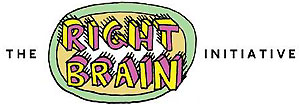The thing about pep rallies is, sometimes there really is something to cheer about. So it was Thursday night inside the Dolores Winningstad Theatre in downtown Portland, where a group no longer called Arts Partners gathered much of the local arts mob for a rebranding celebration — from now on, thanks to the Portland firm North, Arts Partners is The Right Brain Initiative.
For one thing, you’re going to have to finally get that right brain/left brain thing straight in your mind: left brain analytical, right brain intuitive. You can color-code it if that helps.
More importantly, it means that after many years of America’s public schools being pushed further and further into a “back to the basics” position that all too often amounts to deadening drudgery, creative thinking is pushing back. And considering the economic, cultural and environmental challenges of the 21st century, it’s pushing back just in time.
The RBI, which has been spearheaded by the Regional Arts & Cultural Council but has had lots of vital input from many other organizations and individuals (including some local government grants), has set itself a noble if daunting task — to incorporate arts programs “into the education of every K-8 student in the Portland metropolitan region’s school districts.” And the goal has a good kick-start. Beginning this winter, 20 schools will give the idea a test drive — two in the Gresham-Barlow district, six in North Clackamas, four in Hillsboro and eight in the Portland district. Programs will be put in place by Young Audiences of Oregon and Southwest Washington, which has many years’ experience bringing arts events into public schools.
Some good old-fashioned left-brain questions remain to be asked, and a lot of tough left-brain work needs to be done to bring this thing on-line. The point, after all, isn’t to kick analytical thinking out of the schools and substitute it with daydreams, but to teach kids how to fuse their thinking and use their whole brains: analysis and imagination working together. How do we learn? What is the purpose of learning? How do we engage our students in the excitement of discovery? How do we teach them to survive and thrive in a 21st century that demands adaptability and suppleness of thought?
Continue reading Scatter, the new generation: On the right-brain revolution
